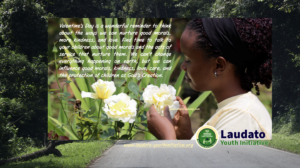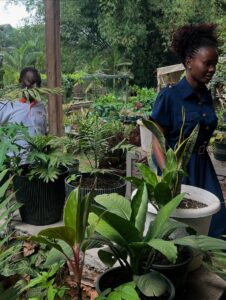Laudato Voices opinion on the Rising Environmental Degradation | September 18, 2025.
Uganda faces severe environmental challenges due to unchecked plastic pollution and rampant wetland degradation. Plastics, especially single-use bags (commonly called kavera), clog drainage systems, pollute soils and water bodies, and are toxic to humans and wildlife (Eco Media Uganda, 2024). Meanwhile, wetlands, critical for water purification, biodiversity, and climate resilience are rapidly disappearing. Uganda’s wetland coverage dropped from 13% in 1994 to 8.9% by 2019 (Monitor, 2024).
These environmental issues are interconnected. Plastics block water channels in wetlands, reducing their ability to absorb floodwaters and recharge groundwater (NEMA, n.d.). This increases the frequency of floods and droughts, degrades water quality, and destroys habitats for flora and fauna. The country also produces roughly 600 metric tons of plastic waste daily, yet less than 40% is collected or recycled (New Vision, 2024).

Legal and Policy Framework in Uganda
Uganda has a robust legal framework addressing plastic use and wetland protection:
1. The Constitution of the Republic of Uganda (1995)
It affirms the right of every Ugandan to a clean and healthy environment and mandates the state to protect natural resources on behalf of citizens (Ommega Online, 2020).
2. National Environment Act (NEA), 2019
This act replaced earlier environmental legislation. It prohibits the production, importation, and use of plastic carrier bags below 30 microns and establishes the Environmental Protection Force (Parliament of Uganda, 2018; InforMEA, 2019).
3. National Environment (Wetlands Management) Regulations, 1999
These regulations restrict activities like draining, reclaiming, or erecting structures in wetlands without permits (NEMA, n.d.).
4. National Environment (Declaration of Wetlands) Notice, 2023
Uganda officially gazetted 8,613 wetlands in 2023, giving them full legal protection (UNDP Uganda, 2024).
5. Local By-laws
Local governments such as Awiodyek Sub-county in Lira District have passed by-laws banning wetland encroachment and penalizing offenders (Monitor, 2024).
6. Plastic Regulation Strategy (2023–2028)
The government has outlined plans to expand the ban to all single-use plastics and enforce existing laws more stringently (Greenpeace Africa, 2025).
Current Actions and Gaps
Efforts like wetland restoration (1,598 hectares restored in FY 2023/24), wetland gazetting, and prosecution of environmental offenders are commendable (NEMA, n.d.). However, gaps remain:
- Partial plastic bans still allow polythene bags above 30 microns (Dispatch Uganda, 2021).
- Underfunding and lack of enforcement personnel hinder implementation (Monitor, 2024).
- Political interference and selective enforcement are major concerns (Nile Post, 2024).
- Limited public awareness and lack of affordable plastic alternatives slow behavioral change. (Laudato Voices, 2025)
Policy Implementation Ideas and opinions to readers and policy makers from our Laudato Voices Influence Policy awareness and media campaign
To address these challenges: with suggest that policy makers and the government should;
- Amend laws to close loopholes by banning all single-use plastics regardless of thickness (Monitor, 2024).
- Operationalize the Environmental Protection Force with adequate training, funding, and autonomy.
- Boost NEMA and district funding to support wetland monitoring and plastic enforcement.
- Incorporate community monitoring using mobile reporting platforms and satellite technology.
- Apply penalties consistently, regardless of social or political status.
- Promote a circular economy by incentivizing biodegradable products and holding manufacturers accountable.
- Support our efforts in running national awareness campaigns through our Laudato Si Clubs in schools, universities, parishes, dioceses and communities. And Media houses too amplify our Laudato Voices Influence Policy awareness and media campaign, if you read this message and involve local leaders.
- Align national and local policies across sectors such as agriculture, construction, and water management.
- Encourage local by-laws that reflect community-specific challenges and solutions (Monitor, 2024).
- Leverage local efforts, national and international partnerships for financial and technical support.
As many of us may be playing the blame games, Uganda has the laws to protect its environment, but enforcement remains a critical weakness of all of us. With wetlands shrinking and plastic waste piling up we have a contribution and a solution to this, and so urgent action is needed beginning from us as individuals, to our communities and leaders (we no longer hear community day cleaning drives in our villages spearheaded by Local Council Chairpersons what what happened?). Well a combination of legal reform, mindset change, love for our Country, community participation, funding, and political will can help our country reverse environmental degradation and move toward sustainability.
References
Eco Media Uganda. (2024, May 25). Uganda plastic pollution challenge. Retrieved from Eco Media Uganda website.
Greenpeace Africa. (2025, May 8). Uganda announces plan to ban single‑use plastic bags. Now we need action, then we need the rest of Africa to join them. Retrieved from Greenpeace Africa website.
Monitor. (2024, various dates). NEMA blames failure to restore wetlands on poor enforcement, funding. Daily Monitor.
National Environment Management Authority (NEMA). (n.d.). Wetlands. Retrieved from NEMA website.
Parliament of Uganda. (2018, November 14). Parliament bans polythene bags below 30 microns. Parliament of Uganda.
UNDP Uganda. (2024, February 23). Uganda commits to protecting wetlands. UNDP.
Laudato Youth Initiative. (2025, May 21). “Laudato Voices” steps up to influence policy awareness and media campaign to care for their common home














